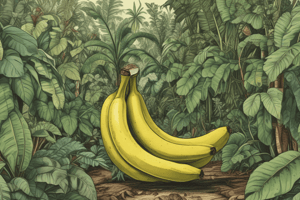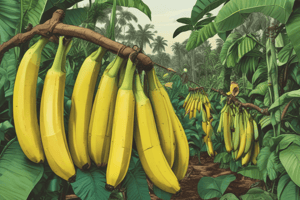Podcast
Questions and Answers
What type of leaves does a mature banana plant produce?
What type of leaves does a mature banana plant produce?
- Cigar leaves
- Rhizome leaves
- Foliage leaves (correct)
- Scale leaves
What characterizes the root system of a banana plant?
What characterizes the root system of a banana plant?
- Roots originate from the surface of the central cylinder (correct)
- Root growth is dependent on leaf type
- Roots grow deep into the soil
- Roots develop primarily from the leaves
Which type of sucker has narrow leaves and a large rhizome?
Which type of sucker has narrow leaves and a large rhizome?
- Flower sucker
- Maiden sucker
- Water sucker
- Sword sucker (correct)
How are the stamens arranged in the androecium of a banana flower?
How are the stamens arranged in the androecium of a banana flower?
What is the structure formed by tightly packed overlapping leaf sheaths in a banana plant?
What is the structure formed by tightly packed overlapping leaf sheaths in a banana plant?
Flashcards
Pseudostem
Pseudostem
A false stem made up of tightly packed leaf sheaths that gives the banana plant its upright structure.
Sucker
Sucker
A lateral shoot that grows from the rhizome and forms a new banana plant.
Rhizome
Rhizome
The underground stem of the banana plant that produces roots and suckers.
Banana Flower
Banana Flower
Signup and view all the flashcards
Banana Fruit
Banana Fruit
Signup and view all the flashcards
Study Notes
Banana (Musa spp.)
- Family: Musaceae
- Habit: Perennial, monocot, herbaceous succulent plant
Corm
- A thickened underground stem
- Stores food for the plant
Leaves
- Alternate or spiral leaf arrangement
- Oval or oblong shape
- Scale leaves: first rudimentary leaves from a growing sucker
- Foliage leaves: mature leaves
- Cigar leaves: recently emerged leaves still rolled as a cylinder
- Precursory appendage: extension at the leaf tip
- Long petiole: attaches leaf to the pseudostem
- Midrib: central vein in the leaf
- Leaf blade: broad, flat portion of the leaf
- Leaf sheath: protective covering around the stem
- Pseudostem: false stem, formed by tightly packed overlapping leaf sheaths
Roots
- From the rhizome, called corm
- Primary roots originating from the central cylinder
- Root system does not penetrate deeply into the soil
Pseudostem
- Looks like a trunk
- Formed by tightly packed overlapping leaf sheaths
- The aerial true stem (floral stem) emerges from the rhizome at the top of the plant when the height of the banana plant reaches maximum
- The plant develops suckers
Suckers
- Lateral shoots
- Develop from the rhizome and emerge near the parent plant
- Maiden sucker: a full-grown sucker bearing foliage leaves
- Two types:
- Sword suckers: narrow leaves, large rhizomes
- Water suckers: broad leaves, small rhizomes
Flowers
- Unisexual
- Monoecious: flowers arranged in racemes
- Subtended by coloured bracts or spathes: flowers below coloured bracts/spathes
- Male flowers: within upper bracts
- Female flowers: within lower bracts
- 6 tepals arranged in 2 whorls
- 1 inner tepal free and boat-shaped
- Other 5 united to form tube-like body
- Androecium: 6 stamens, only 5 fertile
Gynoecium
- Inferior ovary
- A cross-section of the ovary shows a 3-lobed structure
Other important points:
- Different types of banana suckers and how to identify them
- Parts of the banana plant (diagram)
- Stages of banana growth
- Various parts and functions of the plant
- Names for different stages and sections of the plant
- Importance of correct plant identification for propagation purposes
Studying That Suits You
Use AI to generate personalized quizzes and flashcards to suit your learning preferences.




